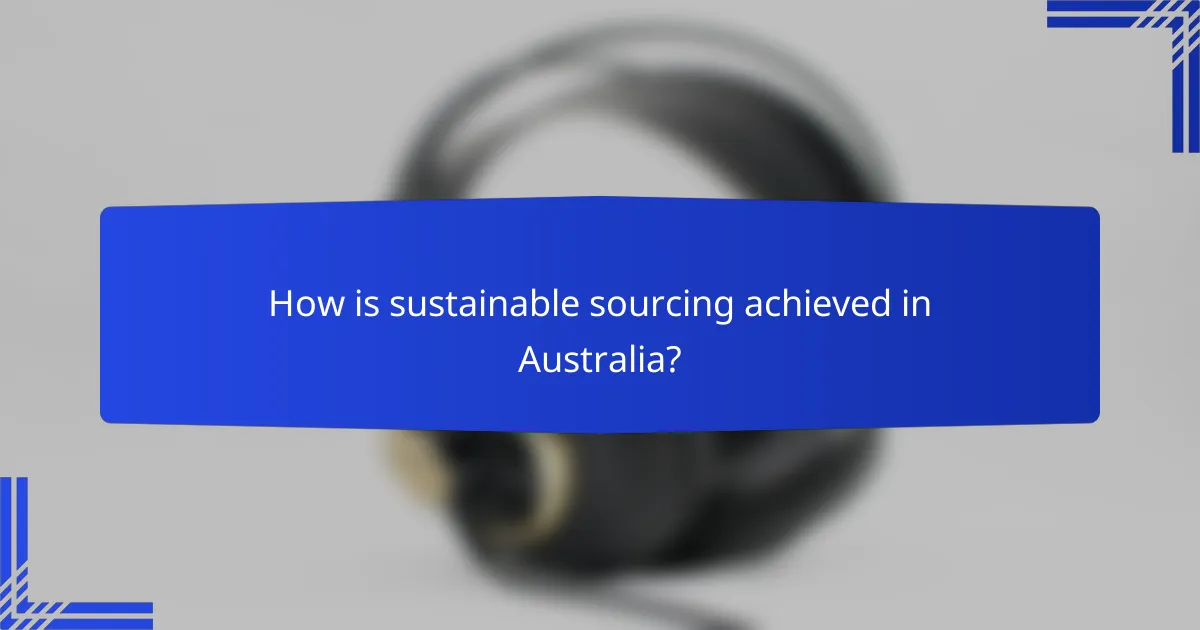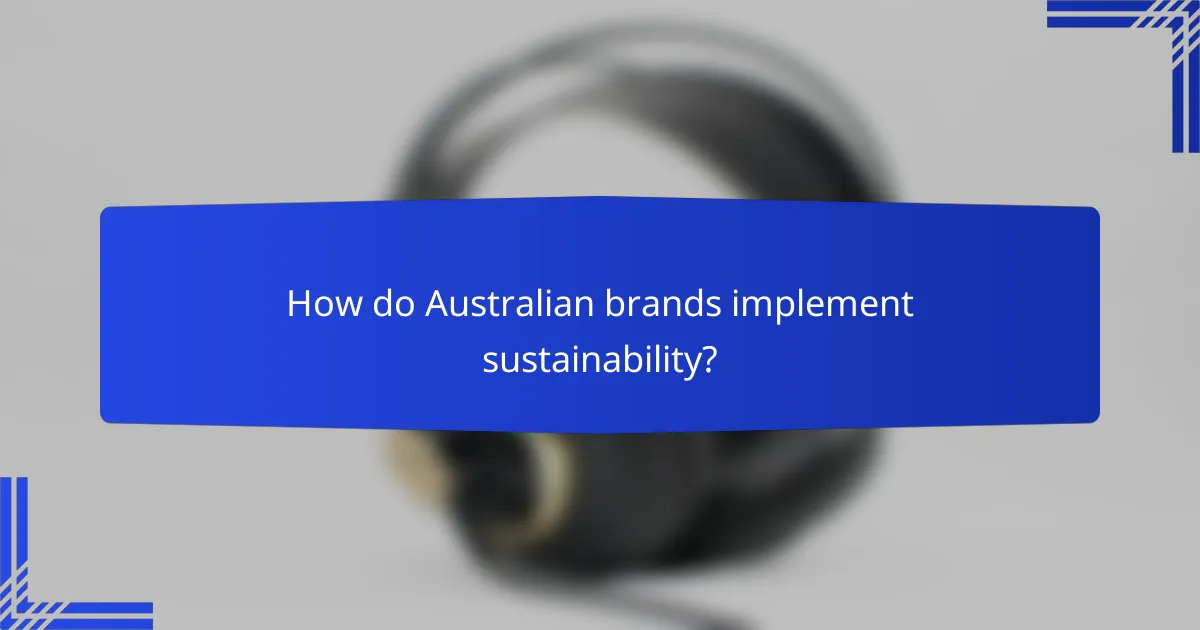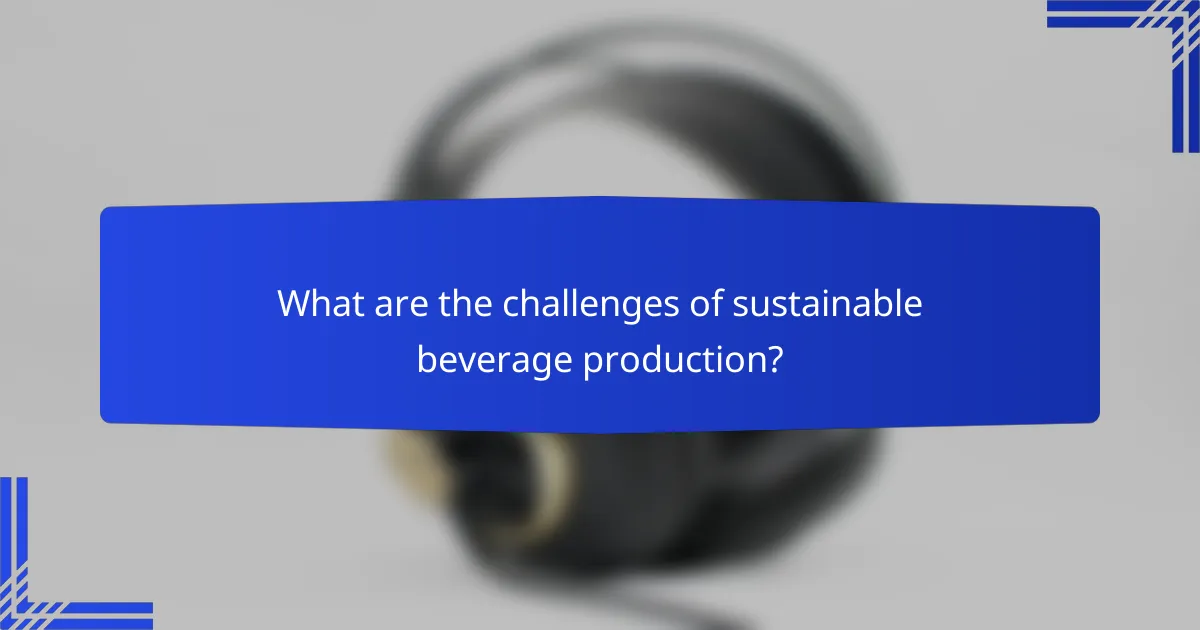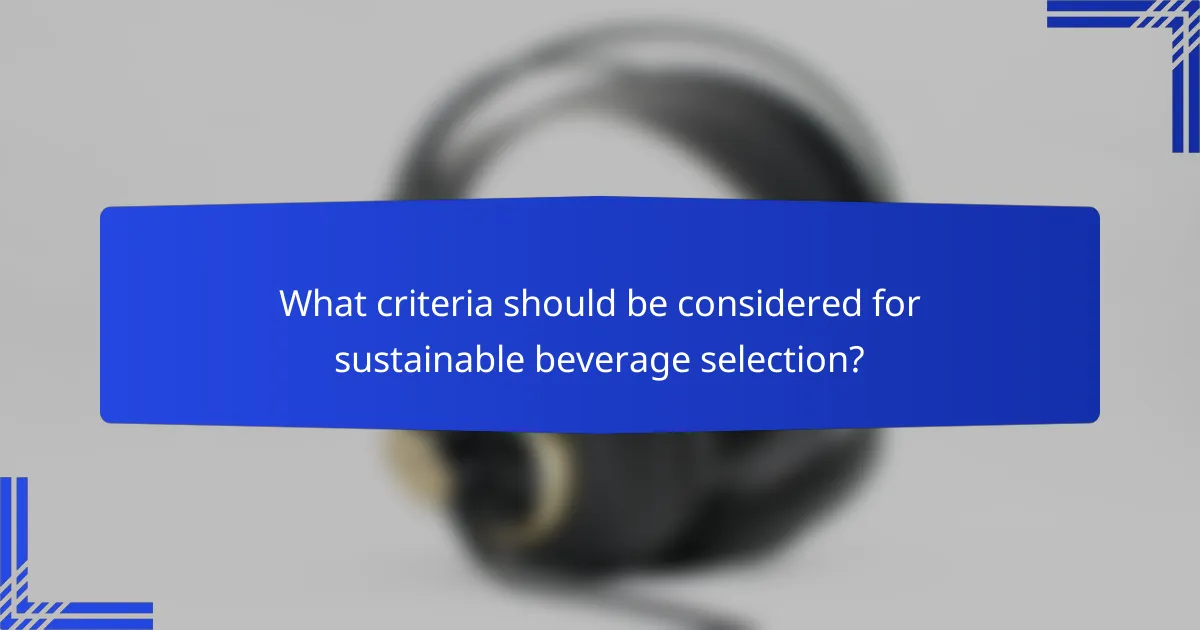Sustainability in beverage making is essential for reducing environmental impact and appealing to eco-conscious consumers. By implementing eco-friendly practices such as sustainable sourcing, efficient production methods, and responsible packaging, companies can minimize waste and resource consumption. This approach not only supports local economies but also enhances product quality and brand reputation.

What are eco-friendly practices in beverage making?
Eco-friendly practices in beverage making focus on minimizing environmental impact through sustainable sourcing, efficient production methods, and responsible packaging. These practices not only reduce waste and resource consumption but also appeal to environmentally conscious consumers.
Use of organic ingredients
Using organic ingredients is a key eco-friendly practice in beverage production. Organic farming avoids synthetic pesticides and fertilizers, promoting healthier ecosystems and biodiversity. When sourcing ingredients, look for certifications like USDA Organic or EU Organic, which ensure compliance with organic standards.
Additionally, local sourcing of organic ingredients can reduce transportation emissions and support local economies. Establishing partnerships with nearby farmers can enhance freshness and sustainability.
Water conservation techniques
Water conservation techniques are essential in beverage making due to the high water usage in production. Implementing practices such as rainwater harvesting, recycling wastewater, and using efficient irrigation systems can significantly reduce water consumption. For example, some breweries recycle water used in cooling processes for cleaning purposes.
Monitoring water usage through smart metering can help identify areas for improvement and ensure compliance with local regulations regarding water use, especially in regions facing water scarcity.
Energy-efficient brewing processes
Energy-efficient brewing processes are vital for reducing the carbon footprint of beverage production. Utilizing energy-efficient equipment, such as high-efficiency boilers and heat exchangers, can lower energy consumption significantly. Many producers are also investing in renewable energy sources like solar or wind to power their operations.
Additionally, optimizing brewing schedules and processes can minimize energy use during peak demand times. Conducting regular energy audits can help identify inefficiencies and opportunities for improvement.
Waste reduction strategies
Waste reduction strategies are crucial in making beverage production more sustainable. Implementing a zero-waste policy can involve reusing by-products, such as using spent grains for animal feed or composting organic waste. This not only reduces landfill contributions but also creates additional revenue streams.
Adopting packaging that is recyclable or biodegradable further supports waste reduction efforts. Engaging consumers in recycling programs can enhance awareness and participation in sustainability initiatives.

How is sustainable sourcing achieved in Australia?
Sustainable sourcing in Australia focuses on minimizing environmental impact while supporting local economies. This involves using local ingredients, adhering to fair trade practices, and selecting seasonal produce to reduce carbon footprints and enhance product quality.
Local ingredient sourcing
Local ingredient sourcing emphasizes using materials grown or produced within Australia. This practice reduces transportation emissions and supports local farmers, fostering community resilience. For instance, many Australian breweries now source grains, hops, and fruits from nearby farms, ensuring freshness and quality.
When selecting local ingredients, consider the proximity of suppliers and the benefits of seasonal availability. Establishing relationships with local producers can lead to better pricing and unique flavor profiles that distinguish your beverages in the market.
Fair trade certifications
Fair trade certifications ensure that producers receive fair compensation and work under safe conditions. In Australia, many beverage makers seek out fair trade coffee, tea, and sugar to promote ethical sourcing. These certifications often require adherence to specific environmental and social standards, which can enhance brand reputation.
To implement fair trade practices, look for certified suppliers and educate consumers about the importance of ethical sourcing. This not only supports global communities but can also attract socially conscious customers willing to pay a premium for responsibly sourced products.
Seasonal ingredient usage
Using seasonal ingredients is a key aspect of sustainable sourcing, as it aligns production with nature’s cycles. In Australia, this means utilizing fruits and vegetables that are at their peak during specific times of the year, which can enhance flavor and reduce reliance on imported goods.
To effectively incorporate seasonal ingredients, develop a flexible production schedule and collaborate with local farmers to understand what is available throughout the year. This approach not only supports sustainability but can also create unique offerings that resonate with consumers looking for fresh, local flavors.

What are the benefits of sustainable packaging?
Sustainable packaging offers numerous advantages, including reduced environmental impact, enhanced brand reputation, and potential cost savings. By utilizing eco-friendly materials and practices, companies can contribute to a healthier planet while appealing to environmentally conscious consumers.
Biodegradable materials
Biodegradable materials break down naturally over time, minimizing waste in landfills. Common examples include plant-based plastics and paper products that decompose within a few months to a couple of years, depending on environmental conditions.
When choosing biodegradable options, consider certifications such as ASTM D6400 or EN 13432, which ensure products meet specific compostability standards. This can help in making informed decisions that align with sustainability goals.
Recyclable packaging options
Recyclable packaging can be processed and reused, reducing the need for new materials. Common recyclable materials include glass, aluminum, and certain plastics, which can be collected and transformed into new products.
To maximize recycling efforts, ensure packaging is clearly labeled with recycling symbols and educate consumers on proper disposal methods. This can significantly improve recycling rates and promote a circular economy.
Reduced carbon footprint
Using sustainable packaging can lead to a reduced carbon footprint by lowering greenhouse gas emissions associated with production and disposal. For instance, lightweight materials require less energy to transport, directly impacting emissions.
Companies can further decrease their carbon footprint by sourcing materials locally, which reduces transportation emissions. Conducting a life cycle assessment can help identify key areas for improvement in sustainability practices.

How do Australian brands implement sustainability?
Australian beverage brands are increasingly adopting sustainable practices to minimize their environmental impact. This includes eco-friendly sourcing of ingredients, innovative packaging solutions, and waste reduction strategies throughout their production processes.
Stone & Wood Brewing Co. practices
Stone & Wood Brewing Co. emphasizes sustainability through its commitment to local sourcing and environmentally friendly production methods. They prioritize using Australian-grown ingredients, which reduces transportation emissions and supports local farmers.
The brewery also implements a range of waste management practices, including recycling and composting, to minimize landfill contributions. Their packaging is designed to be recyclable, and they actively encourage customers to return used bottles for reuse.
Little Creatures sustainability initiatives
Little Creatures focuses on sustainable brewing by utilizing renewable energy sources and reducing water usage in their operations. They have invested in solar power systems to offset their energy consumption, aiming to achieve significant reductions in their carbon footprint.
Additionally, Little Creatures has adopted a circular economy approach by using packaging made from recycled materials. They promote responsible consumption by providing information on recycling and encouraging customers to participate in sustainability efforts.

What are the challenges of sustainable beverage production?
Sustainable beverage production faces several challenges, including cost implications and supply chain complexities. These factors can significantly impact the feasibility and effectiveness of eco-friendly practices in the industry.
Cost implications
The transition to sustainable beverage production often involves higher initial costs. Eco-friendly materials, such as organic ingredients and biodegradable packaging, can be more expensive than conventional options, leading to increased production expenses.
Additionally, companies may need to invest in new technologies or processes to meet sustainability standards, which can further drive up costs. Businesses must weigh these expenses against potential long-term savings and consumer demand for sustainable products.
Supply chain complexities
Sourcing sustainable ingredients can complicate supply chains due to limited availability and the need for transparency. Companies may struggle to find suppliers who adhere to eco-friendly practices, which can disrupt production schedules and increase lead times.
Moreover, ensuring that all components of the supply chain align with sustainability goals requires thorough vetting and ongoing monitoring. This complexity can lead to logistical challenges and potential inconsistencies in product quality.

What criteria should be considered for sustainable beverage selection?
When selecting sustainable beverages, consider factors such as ingredient origin, production methods, and packaging practices. These criteria help ensure that the beverages are not only environmentally friendly but also socially responsible.
Ingredient origin
The origin of ingredients plays a crucial role in sustainability. Look for beverages that source their ingredients locally or from certified organic farms, as this reduces transportation emissions and supports local economies. Additionally, check for certifications like Fair Trade or Rainforest Alliance, which indicate ethical sourcing practices.
Consider the types of ingredients used. Beverages made from seasonal fruits or plants that require less water and fewer chemicals are typically more sustainable. For example, opting for drinks made from native crops can minimize environmental impact and promote biodiversity.
Production methods
Sustainable production methods are essential for reducing the carbon footprint of beverages. Look for companies that use energy-efficient processes, such as solar or wind power, and those that minimize water usage during production. Techniques like cold brewing or fermentation can also reduce energy consumption compared to traditional methods.
Additionally, consider the waste management practices of the producer. Brands that implement recycling programs or use biodegradable materials in their production processes contribute to a more sustainable beverage industry. Always check for transparency in production practices to ensure they align with sustainability goals.

How can consumers support sustainable beverage practices?
Consumers can support sustainable beverage practices by making informed choices that prioritize eco-friendly brands, responsible sourcing, and sustainable packaging. By selecting products that align with these values, individuals contribute to a more environmentally conscious beverage industry.
Choosing eco-friendly brands
When selecting beverages, look for brands that actively promote sustainability through their practices. This includes companies that use organic ingredients, support fair trade, and implement environmentally friendly production methods.
Researching a brand’s certifications can help identify eco-friendly options. Look for labels such as USDA Organic, Fair Trade Certified, or Rainforest Alliance Certified, which indicate a commitment to sustainable practices.
Additionally, consider local brands that prioritize sustainability. Supporting local producers not only reduces carbon emissions associated with transportation but also fosters community engagement and economic growth.
